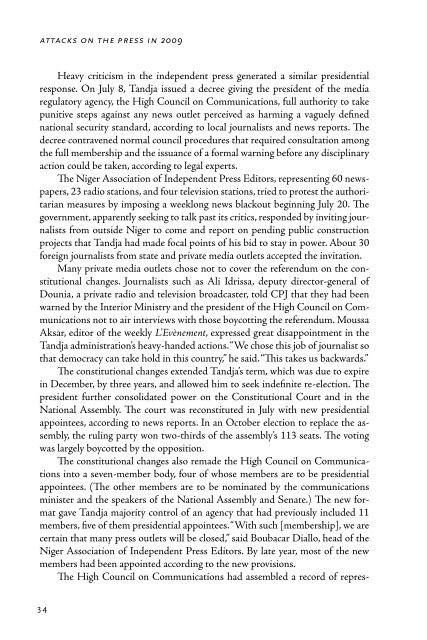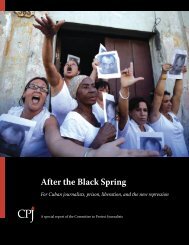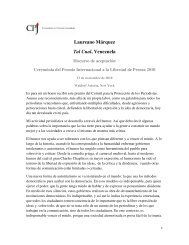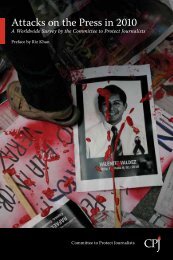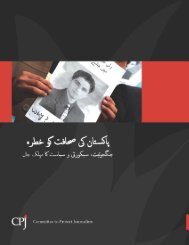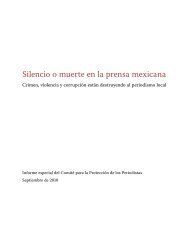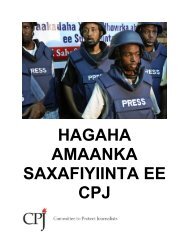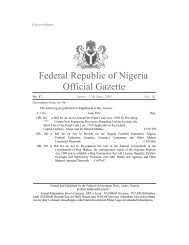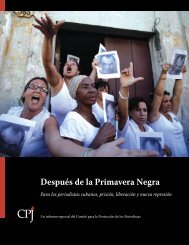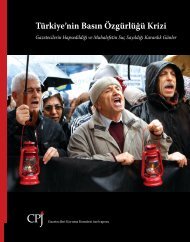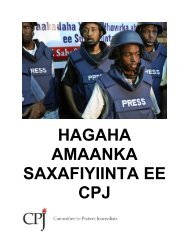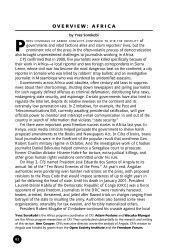Attacks on the Press - Committee to Protect Journalists
Attacks on the Press - Committee to Protect Journalists
Attacks on the Press - Committee to Protect Journalists
- No tags were found...
Create successful ePaper yourself
Turn your PDF publications into a flip-book with our unique Google optimized e-Paper software.
attacks <strong>on</strong> <strong>the</strong> press in 2009africa: nigerHeavy criticism in <strong>the</strong> independent press generated a similar presidentialresp<strong>on</strong>se. On July 8, Tandja issued a decree giving <strong>the</strong> president of <strong>the</strong> mediaregula<strong>to</strong>ry agency, <strong>the</strong> High Council <strong>on</strong> Communicati<strong>on</strong>s, full authority <strong>to</strong> takepunitive steps against any news outlet perceived as harming a vaguely definednati<strong>on</strong>al security standard, according <strong>to</strong> local journalists and news reports. Thedecree c<strong>on</strong>travened normal council procedures that required c<strong>on</strong>sultati<strong>on</strong> am<strong>on</strong>g<strong>the</strong> full membership and <strong>the</strong> issuance of a formal warning before any disciplinaryacti<strong>on</strong> could be taken, according <strong>to</strong> legal experts.The Niger Associati<strong>on</strong> of Independent <strong>Press</strong> Edi<strong>to</strong>rs, representing 60 newspapers,23 radio stati<strong>on</strong>s, and four televisi<strong>on</strong> stati<strong>on</strong>s, tried <strong>to</strong> protest <strong>the</strong> authoritarianmeasures by imposing a weekl<strong>on</strong>g news blackout beginning July 20. Thegovernment, apparently seeking <strong>to</strong> talk past its critics, resp<strong>on</strong>ded by inviting journalistsfrom outside Niger <strong>to</strong> come and report <strong>on</strong> pending public c<strong>on</strong>structi<strong>on</strong>projects that Tandja had made focal points of his bid <strong>to</strong> stay in power. About 30foreign journalists from state and private media outlets accepted <strong>the</strong> invitati<strong>on</strong>.Many private media outlets chose not <strong>to</strong> cover <strong>the</strong> referendum <strong>on</strong> <strong>the</strong> c<strong>on</strong>stituti<strong>on</strong>alchanges. <strong>Journalists</strong> such as Ali Idrissa, deputy direc<strong>to</strong>r-general ofDounia, a private radio and televisi<strong>on</strong> broadcaster, <strong>to</strong>ld CPJ that <strong>the</strong>y had beenwarned by <strong>the</strong> Interior Ministry and <strong>the</strong> president of <strong>the</strong> High Council <strong>on</strong> Communicati<strong>on</strong>snot <strong>to</strong> air interviews with those boycotting <strong>the</strong> referendum. MoussaAksar, edi<strong>to</strong>r of <strong>the</strong> weekly L’Evènement, expressed great disappointment in <strong>the</strong>Tandja administrati<strong>on</strong>’s heavy-handed acti<strong>on</strong>s. “We chose this job of journalist sothat democracy can take hold in this country,” he said. “This takes us backwards.”The c<strong>on</strong>stituti<strong>on</strong>al changes extended Tandja’s term, which was due <strong>to</strong> expirein December, by three years, and allowed him <strong>to</strong> seek indefinite re-electi<strong>on</strong>. Thepresident fur<strong>the</strong>r c<strong>on</strong>solidated power <strong>on</strong> <strong>the</strong> C<strong>on</strong>stituti<strong>on</strong>al Court and in <strong>the</strong>Nati<strong>on</strong>al Assembly. The court was rec<strong>on</strong>stituted in July with new presidentialappointees, according <strong>to</strong> news reports. In an Oc<strong>to</strong>ber electi<strong>on</strong> <strong>to</strong> replace <strong>the</strong> assembly,<strong>the</strong> ruling party w<strong>on</strong> two-thirds of <strong>the</strong> assembly’s 113 seats. The votingwas largely boycotted by <strong>the</strong> oppositi<strong>on</strong>.The c<strong>on</strong>stituti<strong>on</strong>al changes also remade <strong>the</strong> High Council <strong>on</strong> Communicati<strong>on</strong>sin<strong>to</strong> a seven-member body, four of whose members are <strong>to</strong> be presidentialappointees. (The o<strong>the</strong>r members are <strong>to</strong> be nominated by <strong>the</strong> communicati<strong>on</strong>sminister and <strong>the</strong> speakers of <strong>the</strong> Nati<strong>on</strong>al Assembly and Senate.) The new formatgave Tandja majority c<strong>on</strong>trol of an agency that had previously included 11members, five of <strong>the</strong>m presidential appointees. “With such [membership], we arecertain that many press outlets will be closed,” said Boubacar Diallo, head of <strong>the</strong>Niger Associati<strong>on</strong> of Independent <strong>Press</strong> Edi<strong>to</strong>rs. By late year, most of <strong>the</strong> newmembers had been appointed according <strong>to</strong> <strong>the</strong> new provisi<strong>on</strong>s.The High Council <strong>on</strong> Communicati<strong>on</strong>s had assembled a record of repres-sive acti<strong>on</strong>s over <strong>the</strong> years, but its members had also asserted some level of independence.Earlier in 2009, six members publicly opposed Council PresidentDaouda Diallo’s effort <strong>to</strong> ban Dounia, a broadcaster known for its favorablecoverage of exiled politician Hama Amadou. Speaking <strong>to</strong> CPJ, Diallo accusedDounia of broadcasting a “call for insurrecti<strong>on</strong>” by airing statements opposing <strong>the</strong>c<strong>on</strong>stituti<strong>on</strong>al changes. The six members said in a statement that Diallo had actedimproperly by imposing <strong>the</strong> ban unilaterally. A High Court judge agreed and rescinded<strong>the</strong> ban against Dounia <strong>on</strong> July 2.Tandja’s bid <strong>to</strong> stay in office exacerbated l<strong>on</strong>gstanding tensi<strong>on</strong> between <strong>the</strong>independent press and <strong>the</strong> government—a strain fueled by years of censorship,criminal prosecuti<strong>on</strong>s, and impris<strong>on</strong>ments of journalists covering sensitive issues.Coverage of corrupti<strong>on</strong>, particularly in <strong>the</strong> management of Niger’s natural resources,drew harsh government resp<strong>on</strong>ses in 2009.In early August, just days before <strong>the</strong> referendum, police questi<strong>on</strong>ed edi<strong>to</strong>rsof eight private newspapers that detailed leaked documents purporting <strong>to</strong> showthat profits from uranium mining had been funneled <strong>to</strong> President Tandja’s s<strong>on</strong>,Hadia. In a separate case in April, Dounia Direc<strong>to</strong>r General Abibou Garba wascharged with criminal defamati<strong>on</strong> and broadcasting false news after his stati<strong>on</strong>aired a debate in which an activist described a uranium deal between <strong>the</strong> Frenchnuclear energy company AREVA and <strong>the</strong> government as <strong>the</strong> “looting of Niger’sresources.” The case was pending in late year.The arrests undercut Tandja’s public pledges <strong>to</strong> fight entrenched graft. Nigerranked poorly—115th am<strong>on</strong>g 180 countries—in terms of corrupti<strong>on</strong>, according<strong>to</strong> Transparency Internati<strong>on</strong>al’s 2008 public corrupti<strong>on</strong> index. The private pressregularly reported <strong>on</strong> alleged mismanagement of public instituti<strong>on</strong>s, often at <strong>the</strong>cost of impris<strong>on</strong>ment and harassment. In January, Edi<strong>to</strong>r Boussada Ben Ali of<strong>the</strong> weekly L’Acti<strong>on</strong> was jailed in c<strong>on</strong>necti<strong>on</strong> with a s<strong>to</strong>ry alleging that <strong>the</strong> FinanceMinistry had awarded a medical supply c<strong>on</strong>tract without open bidding. A judgec<strong>on</strong>victed Ali of “divulging informati<strong>on</strong> likely <strong>to</strong> undermine public order” andsentenced him <strong>to</strong> three m<strong>on</strong>ths in pris<strong>on</strong>. When Ali’s lawyer, Yahouza Amani,publicly criticized <strong>the</strong> ruling, he was arrested and detained for 24 hours for “discreditinga justice decisi<strong>on</strong>,” local journalists said. In a separate case in September,Edi<strong>to</strong>r Ibrahim Soumana Gaoh of <strong>the</strong> private weekly Le Témoin spent nine daysin pris<strong>on</strong> over a s<strong>to</strong>ry accusing former Communicati<strong>on</strong>s Minister Mohamed BenOmar of involvement in an embezzlement scheme at <strong>the</strong> nati<strong>on</strong>al telecommunicati<strong>on</strong>scompany SONITEL.The case of ano<strong>the</strong>r impris<strong>on</strong>ed journalist, Abdoulaye Tiémogo, edi<strong>to</strong>r of <strong>the</strong>weekly Le Canard Déchaîné, illustrated <strong>the</strong> government’s determinati<strong>on</strong> <strong>to</strong> persecutecritical journalists. Tiémogo had been arrested at least three times and had g<strong>on</strong>e in<strong>to</strong>hiding in fear of arrest at least <strong>on</strong>ce during this decade, according <strong>to</strong> CPJ research.3 4 3 5


